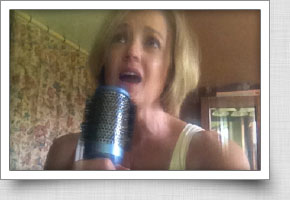How to talk to your kids about divorce
June 30, 2013The creative energy of the Box Factory for the Art…
August 14, 2013Okay, not professionally, although I did sing with a group that travelled across the southeast, performing in churches along the way and we even recorded two albums, a sample of which will not be provided here! But mostly I sang along with the radio, belting emotion through open windows down my childhood country roads. I played the flute and guitar, sang duets with my sister and friend, and to this day can sing the lyrics to most songs of my era after only hearing the first two or three notes.

But somewhere along the way I quit. I married Dearest who has a beautiful, rich, baritone voice who regularly sings for special music at church and weddings, and performs in musicals (his Tevye would threaten Topol himself!) In the last year or so, when I do sing, I’ve noticed that my voice has become gravely—ragged—and so I sing even less. Where along the way did I lose my voice?
I talked this week with a friend who works as a professional speaker and trainer. After spending July at her mountain cabin with no phone, Wi-Fi, or much conversation, she found that her voice felt strained after only brief exchanges. The silence of a retreat in the mountains left her voice out of practice.
In conflict, we can lose our voices. We’re stunned and stung by the intensity of the conflict—the words spoken to us from someone we care about and whom we believed cared about us. If that conflict is allowed to simmer and go unaddressed for a long time one can lose one’s voice until one day you scream—with a ragged and gravely voice perhaps, “Enough!” Permanent rifts, divorce, and Facebook rants occur.
So, how do you keep your voice in conditioned and in shape?
This morning I listened to Marie Osmund sing Pie Jesu. Turns out the girl who was “a little bit country” can turn on the opera. It’s from her aptly named album, “I Can Do This,” which she recorded following the suicide of her son. You can listen too at by clicking here. And I practiced—okay, an octave lower than Marie—but I put my hand on my diaphragm to determine whether my breath was being drawn from the right place. I thought about the constriction in my throat as I sang. I’m not ready to book concerts, but I too can do this.
Have you lost your voice in conflict? Or, do you hear your voice but know it’s not spouting anything remotely beautiful, i.e. helpful in resolving the conflict? Maybe you’re out of practice and forgot how to do it well. It’s time to revisit the mechanics and commit to practicing the art of conflict as catalyst.
In addition to building in a pause when you find yourself confronted by conflict, review the LENS metaphor described at http://familyresolutions.us/2012/10/i-can-see-clearly-now-the-conflicts-gone. Commit to engaging and not simply avoiding conflict, so that your voice can be conditioned and you too can sing again.
And me? Well I’ve downloaded some voice exercises and plan to give Sarah Brightman some competition singing “Think of Me” in Phantom of the Opera!
Wishing you wisdom,






1 Comment
Thanks, Deb! If, in the moment when our voice in conflict sounds so raggedy, we could be as patient and forgiving of ourselves as your post radiates, wouldn’t that be rich? Just keep sounding raggedy, but with a whole different perspective about ourselves and others. It could shift the whole conversation.